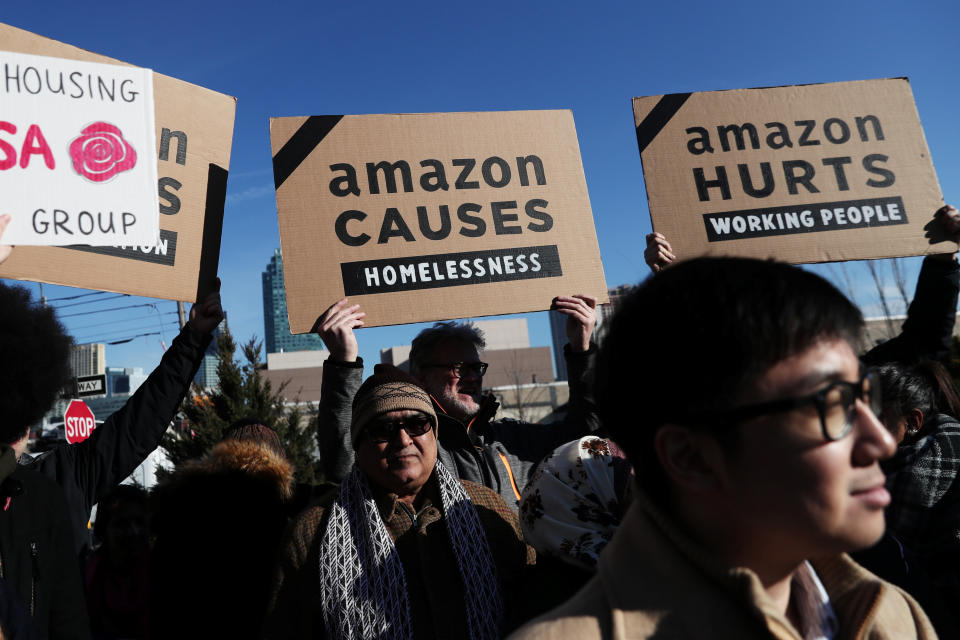The problem with Elizabeth Warren's plan to break up Facebook, Google, and Amazon
Senator Elizabeth Warren proposed in a Medium post on Friday to dismantle so-called Big Tech — Facebook (FB), Google (GOOG, GOOGL), and Amazon (AMZN) — but antitrust experts found serious flaws in her proposal.
The presidential hopeful is using a “sledgehammer,” that is, breaking companies up, to address problems like data privacy that could be solved in other ways, noted Herbert Hovenkamp, a leading authority on antitrust law.
Because of economies of scale, Hovenkamp noted, bigger companies can offer cheaper products, and forcing them to spin off businesses could hurt consumers.
“Customers are not complaining about Amazon — it’s got some of the highest consumer evaluations in retailing. The story for smaller businesses is a little more mixed. But on balance, a lot of them like dealing with Amazon,” noted Hovenkamp, a professor at the University of Pennsylvania law school.
‘Big, structural changes’
Nevertheless, U.S. tech giants have still engendered their fair share of rage and distrust from the American people. Warren appeared to be trying to capitalize on that in her proposal to “make big, structural changes to the tech sector.”
Her proposal is two-pronged: First, she wants to push Congress to pass legislation requiring companies with annual global revenue of $25 billion or more that offer “an online marketplace, an exchange, or a platform” to be designated “platform utilities.”

Platform utilities and participants on those platforms could not be part of the same company. So, for example, Amazon Marketplace and AmazonBasics, its private label product line, would have to be split apart. Google search and Google’s ad exchange could no longer be part of the same company, either.
Second, Warren would appoint regulators committed to unwinding supposedly anti-competitive mergers, including Amazon’s acquisition of Whole Foods; Facebook’s purchase of WhatsApp and Instagram; and Google’s ownership of Waze, Nest, and DoubleClick.
‘A lot of pushback’
Four antitrust experts told Yahoo Finance that it would be highly unlikely that Congress would move to force big companies to spin off parts of themselves.
“It won’t pass before the next election for sure and I think there’s going to be a lot of pushback even within the Democratic party and the reason is these broad-scale divestiture or breakup provisions are likely to produce much higher prices,” Hovenkamp noted. “Democrats tend to represent a lot of lower income people — they may be the ones who are hurt the most.”

While Amazon’s purchase of Whole Foods, for example, might hurt other grocers, it’s not clear the acquisition caused harm to the people buying groceries. Ultimately, antitrust law is about protecting consumers, not the competition.
“At the end of the day, the real test is over the long run, are consumers worse off as a result of this behavior? That’s still pretty much the conventional theory,” said George Hay, a professor at Cornell University’s Law School.
It may also be tough for Warren to appoint regulators who will be successful at retroactively undoing mergers, like Facebook’s purchase of Instagram. Technically, regulators do have the authority to challenge mergers that have already been approved. But those challenges will have to be upheld by federal courts.
“The problem is you’re going to make that case before the federal judiciary after four years of Trump appointments, including two Supreme Court appointments, Christopher Sagers, an antitrust expert and professor at the Cleveland-Marshall College of Law, told Yahoo Finance.
‘Remedies that are tailored to identify the harms’
Still, Sagers said it makes his heart “sing” to hear a presidential hopeful push for more antitrust enforcement. While he agreed that her legislative push was politically implausible, Sagers disagreed with the notion that bigger companies are necessarily better for consumers.
“There’s no evidence that firms need to be big just to be efficient,” Sagers argued. “I don’t think that breaking up these companies is likely to make prices go up and impede consumer service. I do think that more competition actually drives innovation more than people want to believe.”

In her post on Medium, Warren cited the Justice Department’s 1990s-era antitrust case against Microsoft, which ended in a settlement requiring the company to disclose more information to competitors. Ironically, Warren contended that the deal allowed the very innovation that paved the way for Facebook and Google — the tech giants she’s trying to cut down to size.
Notably, that case did not result in a breakup of Microsoft, which is also thriving today. It’s possible that some concerns over Facebook, Amazon, and Google — including concerns over data collection — could be arguably be addressed through means other than shrinking the size of these companies.
“If manipulation of information at a large scale is what we’re worried about, we need to go after the manipulation of information, not just break up the company, which could produce dramatically higher prices,” Hovenkamp said.
Rather than going Warren’s route, the U.S. may end up passing a federal data privacy law that could regulate tech companies much more heavily while leaving them intact. In the meantime, Amazon, Facebook, Google, and other tech giants may want to brace themselves for more criticism from lawmakers on all sides.
Erin Fuchs is deputy managing editor at Yahoo Finance.
